Abstract
OBJECTIVE: To review the results of randomized controlled trials on the effectiveness of brief physician interventions with problem drinkers. DATA SOURCES: The MEDLINE and EMBASE databases were searched for articles published from 1966 and 1972 respectively, with the terms "problem/controlled/responsible/moderate/risk/drink"; "advice/drink"; "physician, nurse, general practitioner"; and "random." Forty-three articles were identified in the EMBASE search and 112 articles in the MEDLINE search. STUDY SELECTION: All trials examining the effectiveness of interventions by physicians in reducing alcohol consumption among problem drinkers attending a health-care facility were reviewed. Trials involving subjects attending an alcohol treatment clinic and those involving interventions delivered solely by nonphysicians were excluded. Eleven trials met the final selection criteria. DATA EXTRACTION: For each article, two of the authors independently assigned a score from 0 to 2 on a number of criteria for validity and generalizability. DATA SYNTHESIS: The four trials with the highest validity scores showed that men in the intervention groups reduced their weekly alcohol consumption by five to seven standard drinks more than the men in the control groups. Results for women were inconsistent. No convincing evidence of declines in alcohol-related morbidity among men or women was found. CONCLUSIONS: The trials support the use of brief interventions by physicians for patients with drinking problems. Although further studies are needed to determine their effect on morbidity and mortality, the public health impact of such interventions is potentially enormous. Further research is needed to determine which patients are best suited for brief interventions, the optimal intensity of treatment and which components of brief interventions are most effective. Research is also needed to establish which strategies are effective in inducing physicians to use brief interventions.
Full text
PDF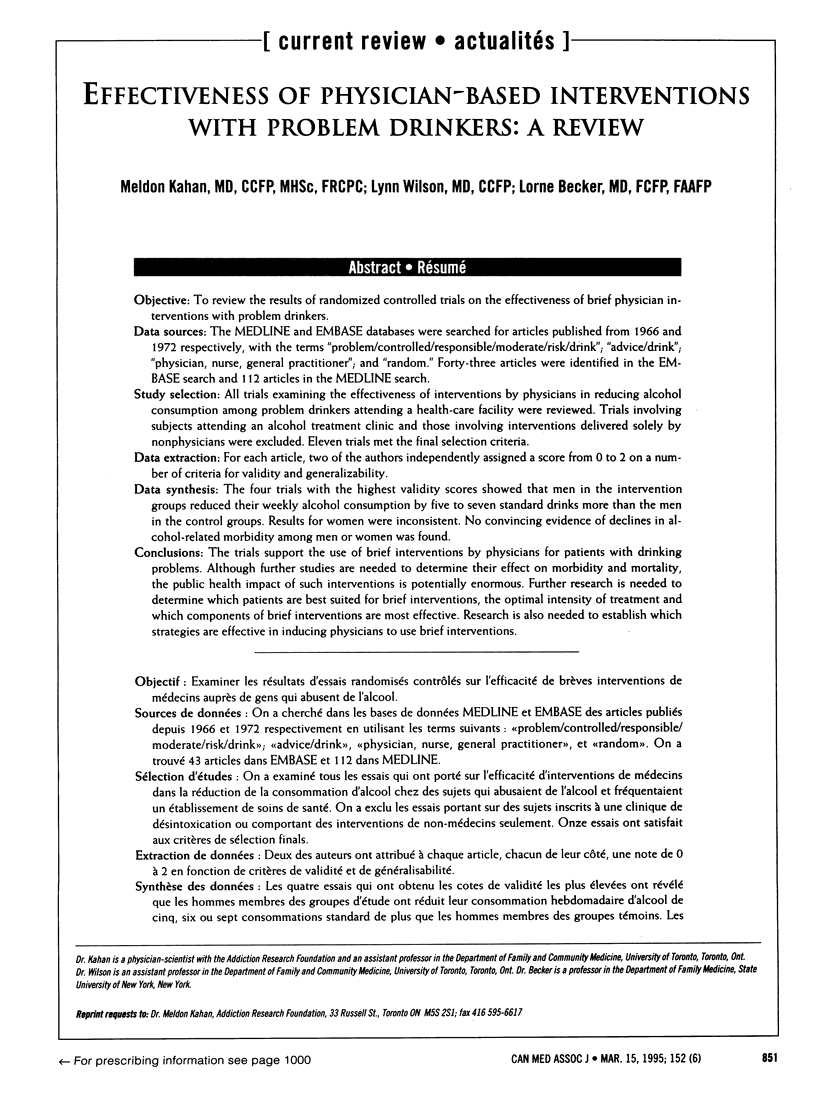
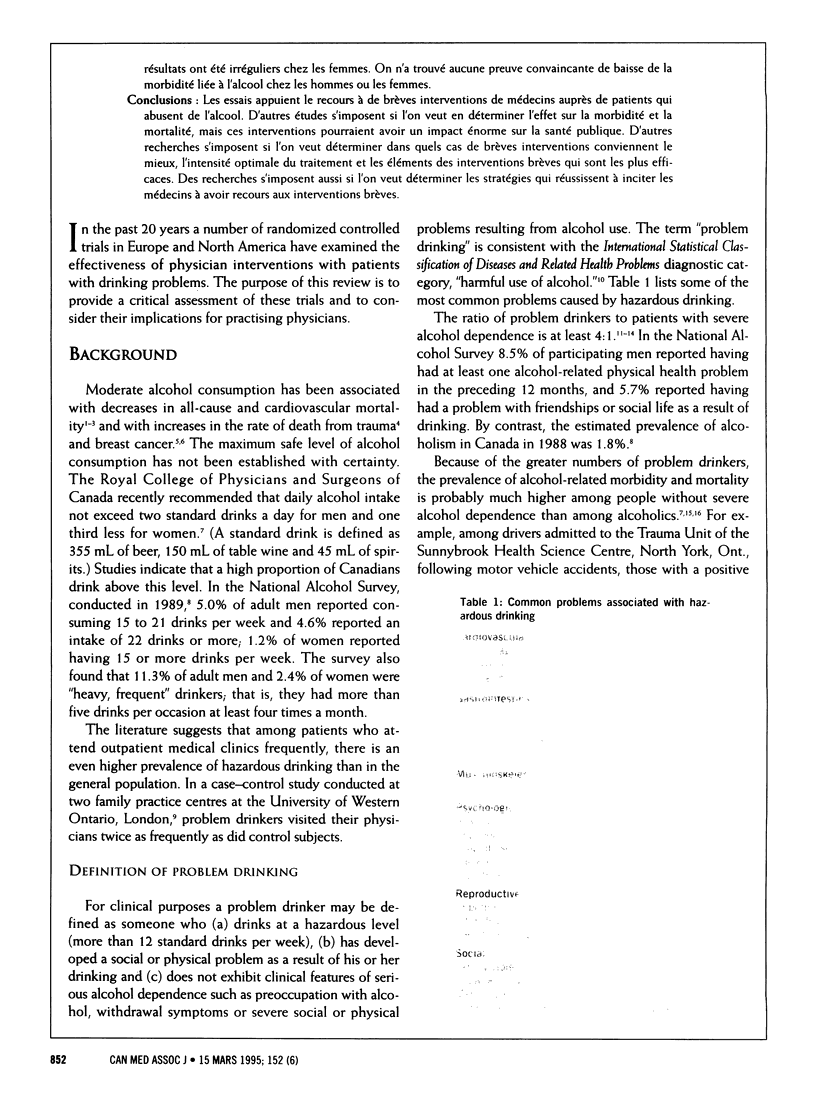
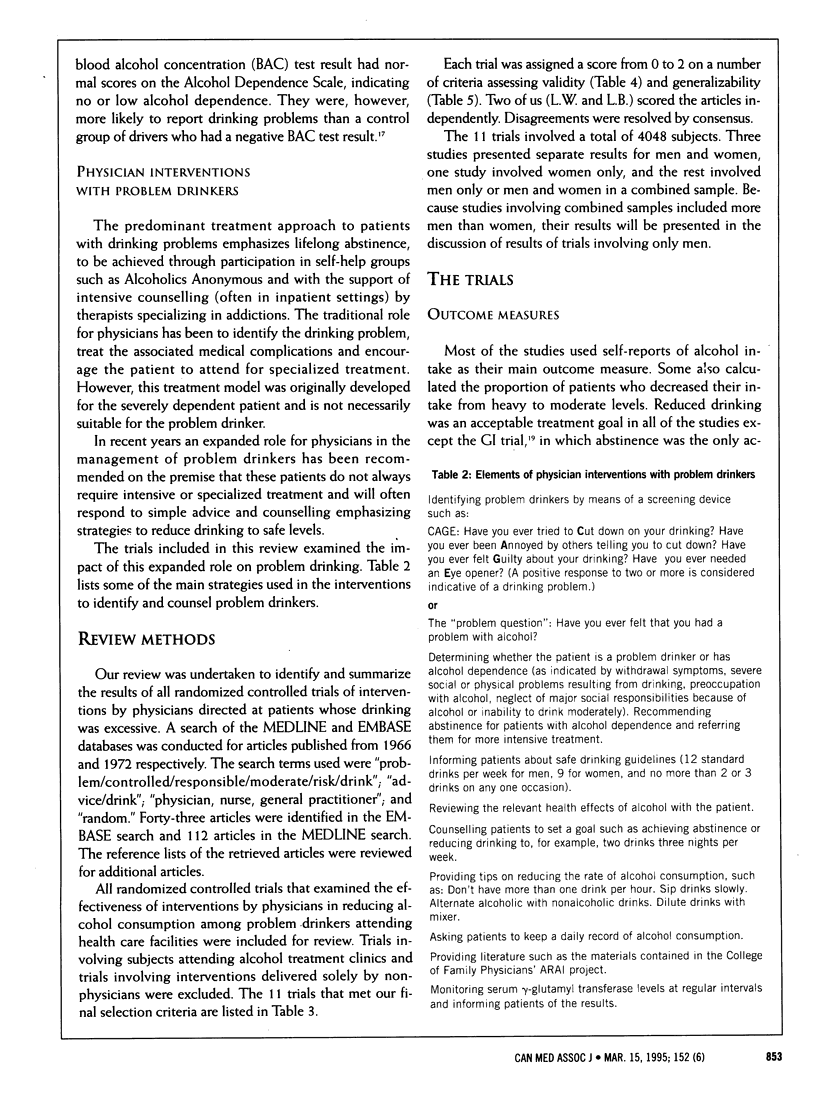

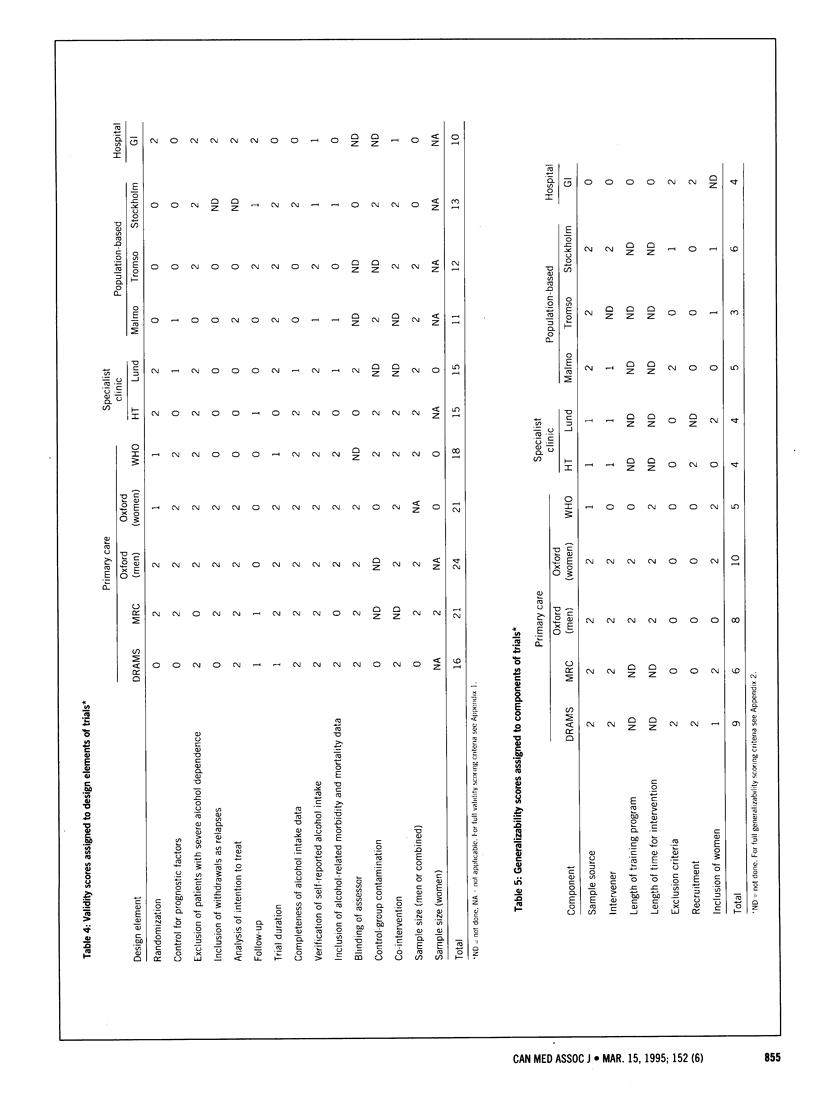
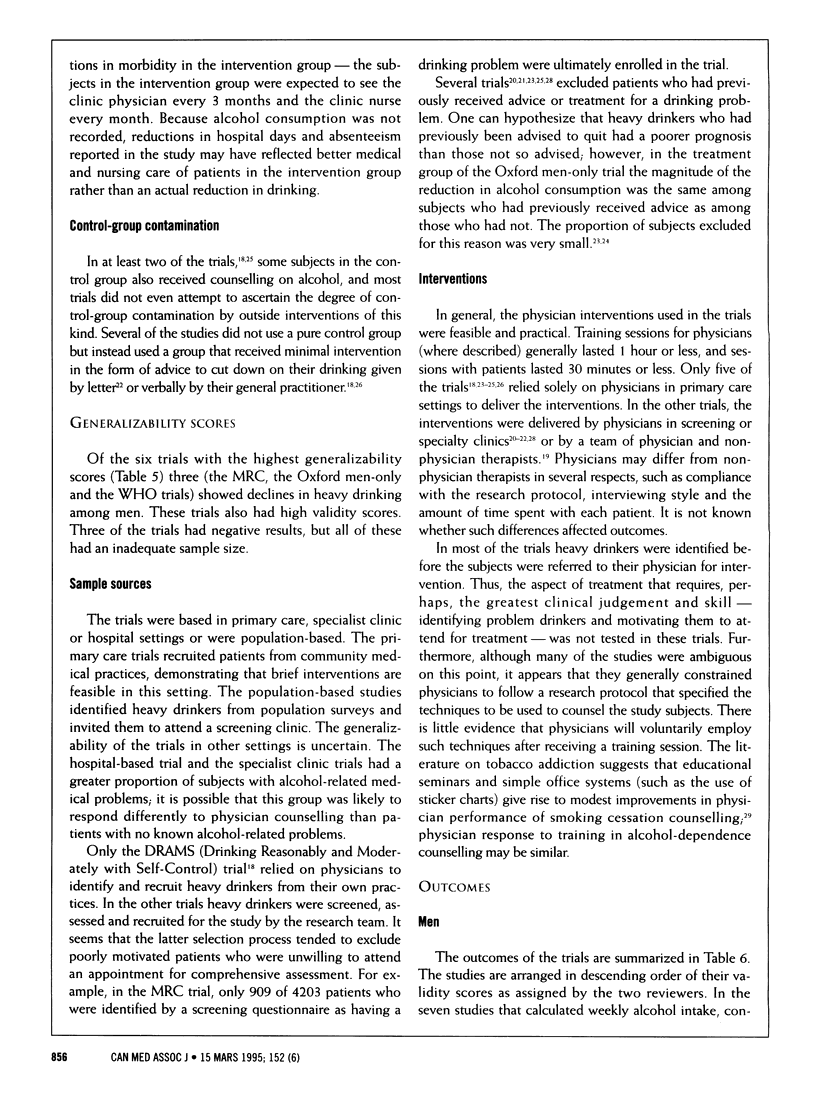
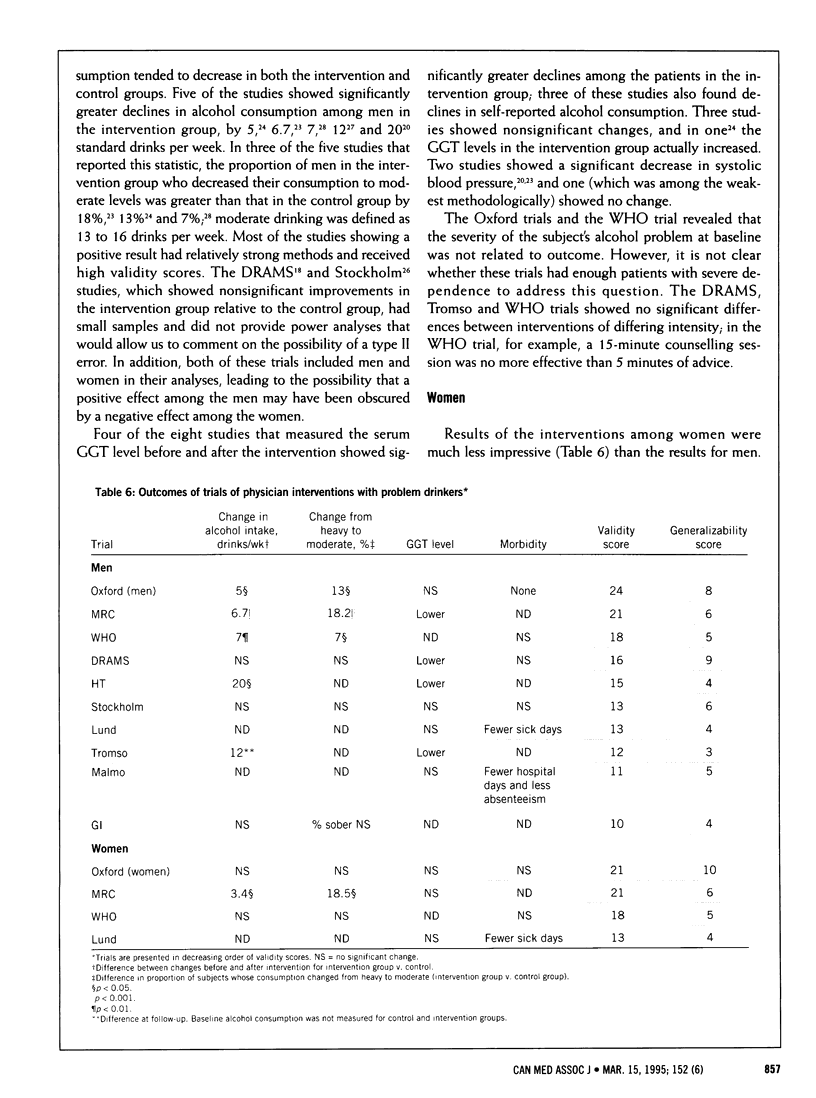
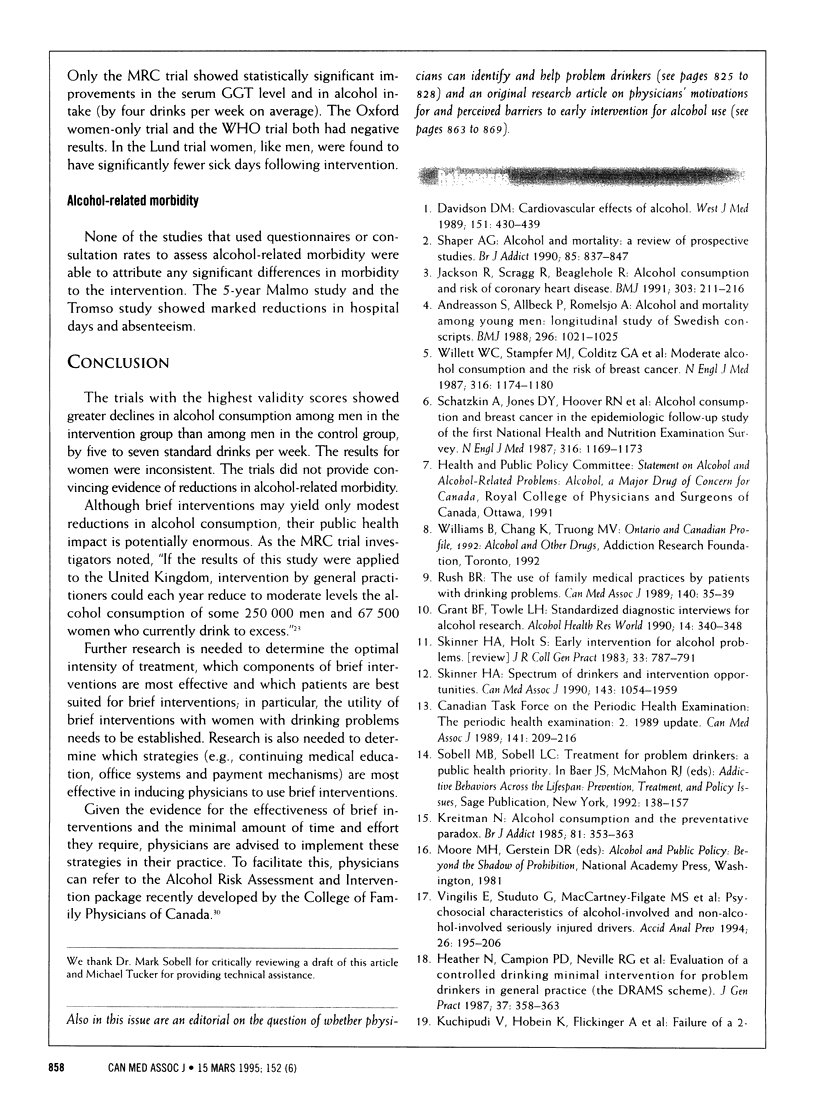
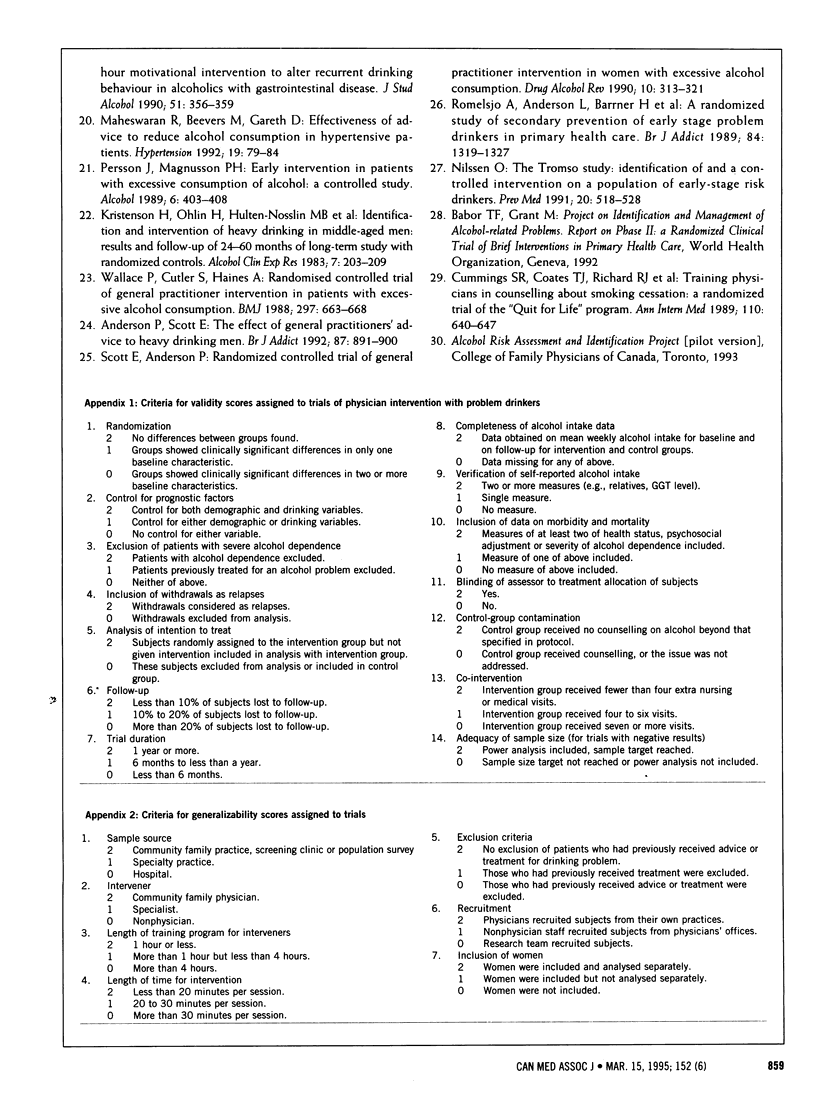
Selected References
These references are in PubMed. This may not be the complete list of references from this article.
- Anderson P., Scott E. The effect of general practitioners' advice to heavy drinking men. Br J Addict. 1992 Jun;87(6):891–900. doi: 10.1111/j.1360-0443.1992.tb01984.x. [DOI] [PubMed] [Google Scholar]
- Andreasson S., Allebeck P., Romelsjö A. Alcohol and mortality among young men: longitudinal study of Swedish conscripts. Br Med J (Clin Res Ed) 1988 Apr 9;296(6628):1021–1025. doi: 10.1136/bmj.296.6628.1021. [DOI] [PMC free article] [PubMed] [Google Scholar]
- Cummings S. R., Coates T. J., Richard R. J., Hansen B., Zahnd E. G., VanderMartin R., Duncan C., Gerbert B., Martin A., Stein M. J. Training physicians in counseling about smoking cessation. A randomized trial of the "Quit for Life" program. Ann Intern Med. 1989 Apr 15;110(8):640–647. doi: 10.7326/0003-4819-110-8-640. [DOI] [PubMed] [Google Scholar]
- Davidson D. M. Cardiovascular effects of alcohol. West J Med. 1989 Oct;151(4):430–439. [PMC free article] [PubMed] [Google Scholar]
- Heather N., Campion P. D., Neville R. G., Maccabe D. Evaluation of a controlled drinking minimal intervention for problem drinkers in general practice (the DRAMS scheme). J R Coll Gen Pract. 1987 Aug;37(301):358–363. [PMC free article] [PubMed] [Google Scholar]
- Jackson R., Scragg R., Beaglehole R. Alcohol consumption and risk of coronary heart disease. BMJ. 1991 Jul 27;303(6796):211–216. doi: 10.1136/bmj.303.6796.211. [DOI] [PMC free article] [PubMed] [Google Scholar]
- Kreitman N. Alcohol consumption and the preventive paradox. Br J Addict. 1986 Jun;81(3):353–363. doi: 10.1111/j.1360-0443.1986.tb00342.x. [DOI] [PubMed] [Google Scholar]
- Kristenson H., Ohlin H., Hultén-Nosslin M. B., Trell E., Hood B. Identification and intervention of heavy drinking in middle-aged men: results and follow-up of 24-60 months of long-term study with randomized controls. Alcohol Clin Exp Res. 1983 Spring;7(2):203–209. doi: 10.1111/j.1530-0277.1983.tb05441.x. [DOI] [PubMed] [Google Scholar]
- Kuchipudi V., Hobein K., Flickinger A., Iber F. L. Failure of a 2-hour motivational intervention to alter recurrent drinking behavior in alcoholics with gastrointestinal disease. J Stud Alcohol. 1990 Jul;51(4):356–360. doi: 10.15288/jsa.1990.51.356. [DOI] [PubMed] [Google Scholar]
- Maheswaran R., Beevers M., Beevers D. G. Effectiveness of advice to reduce alcohol consumption in hypertensive patients. Hypertension. 1992 Jan;19(1):79–84. doi: 10.1161/01.hyp.19.1.79. [DOI] [PubMed] [Google Scholar]
- Nilssen O. The Tromsø Study: identification of and a controlled intervention on a population of early-stage risk drinkers. Prev Med. 1991 Jul;20(4):518–528. doi: 10.1016/0091-7435(91)90049-a. [DOI] [PubMed] [Google Scholar]
- Persson J., Magnusson P. H. Early intervention in patients with excessive consumption of alcohol: a controlled study. Alcohol. 1989 Sep-Oct;6(5):403–408. doi: 10.1016/0741-8329(89)90011-6. [DOI] [PubMed] [Google Scholar]
- Romelsjö A., Andersson L., Barrner H., Borg S., Granstrand C., Hultman O., Hässler A., Källqvist A., Magnusson P., Morgell R. A randomized study of secondary prevention of early stage problem drinkers in primary health care. Br J Addict. 1989 Nov;84(11):1319–1327. doi: 10.1111/j.1360-0443.1989.tb00733.x. [DOI] [PubMed] [Google Scholar]
- Rush B. R. The use of family medical practices by patients with drinking problems. CMAJ. 1989 Jan 1;140(1):35–39. [PMC free article] [PubMed] [Google Scholar]
- Schatzkin A., Jones D. Y., Hoover R. N., Taylor P. R., Brinton L. A., Ziegler R. G., Harvey E. B., Carter C. L., Licitra L. M., Dufour M. C. Alcohol consumption and breast cancer in the epidemiologic follow-up study of the first National Health and Nutrition Examination Survey. N Engl J Med. 1987 May 7;316(19):1169–1173. doi: 10.1056/NEJM198705073161901. [DOI] [PubMed] [Google Scholar]
- Scott E., Anderson P. Randomized controlled trial of general practitioner intervention in women with excessive alcohol consumption. Drug Alcohol Rev. 1991;10(4):313–321. doi: 10.1080/09595239100185371. [DOI] [PubMed] [Google Scholar]
- Shaper A. G. Alcohol and mortality: a review of prospective studies. Br J Addict. 1990 Jul;85(7):837–861. doi: 10.1111/j.1360-0443.1990.tb03710.x. [DOI] [PubMed] [Google Scholar]
- Skinner H. A., Holt S. Early intervention for alcohol problems. J R Coll Gen Pract. 1983 Dec;33(257):787–791. [PMC free article] [PubMed] [Google Scholar]
- Skinner H. A. Spectrum of drinkers and intervention opportunities. CMAJ. 1990 Nov 15;143(10):1054–1059. [PMC free article] [PubMed] [Google Scholar]
- Vingilis E., Stoduto G., Macartney-Filgate M. S., Liban C. B., McLellan B. A. Psychosocial characteristics of alcohol-involved and nonalcohol-involved seriously injured drivers. Accid Anal Prev. 1994 Apr;26(2):195–206. doi: 10.1016/0001-4575(94)90089-2. [DOI] [PubMed] [Google Scholar]
- Wallace P., Cutler S., Haines A. Randomised controlled trial of general practitioner intervention in patients with excessive alcohol consumption. BMJ. 1988 Sep 10;297(6649):663–668. doi: 10.1136/bmj.297.6649.663. [DOI] [PMC free article] [PubMed] [Google Scholar]
- Willett W. C., Stampfer M. J., Colditz G. A., Rosner B. A., Hennekens C. H., Speizer F. E. Moderate alcohol consumption and the risk of breast cancer. N Engl J Med. 1987 May 7;316(19):1174–1180. doi: 10.1056/NEJM198705073161902. [DOI] [PubMed] [Google Scholar]


